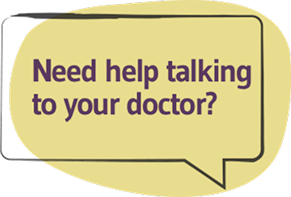Living With AHP
Everyday living with AHP
Acute hepatic porphyria (AHP) is unpredictable and can disrupt everything from sleep to work and social life. Many live in constant fear of the next attack. While it's a lifelong disease, there are steps you can take to help reduce the chance of attacks and improve quality of life.

To help you have a meaningful conversation with your doctor about AHP, create a personalized Doctor Discussion Guide by taking the Symptom Questionnaire. Make sure to bring it with you to your next doctor visit.
There are a number of triggers for AHP attacks
Common triggers are shown below. Since triggers can be different for every person, there may be others not listed here.

Some medications

Hormones
including levels of estrogen and progesterone. These hormones fluctuate the most during the 2 weeks before a woman’s menstrual cycle begins

Alcohol

Smoking

Stress caused by:
- Infections
- Surgery
- Physical exhaustion
- Emotional exhaustion

Fasting
or extreme dieting
Stay in touch with your community
AHP is a debilitating disease, and the burden you experience daily is not always visible. Sharing your experience or finding ways to connect with others with a similar journey can change things for the better.
+50% of people
with AHP reported feeling lonely or isolated.*
+70% of people
with AHP felt increased guilt and frustration about how their disease impacts the people around them.*
*Results from a multinational study that surveyed 92 adult patients with AHP.
Don’t hesitate to reach out to someone

Talk to those close to you
The unpredictability of AHP can also impact your loved ones, and keeping them aware of how you feel can make all the difference.

Talk to your doctor
Whether it’s a physical or mental health concern, sharing your symptoms can help them tailor a management plan that’s right for you.
Get the help you need
If you have AHP, it’s important to keep communication lines with your healthcare team open. Sharing your symptoms and concerns can help them tailor a management plan that is right for you.
Find community and support from these patient organizations



